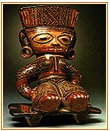
 The Land of People  Over and over again, people tell us the spontaneous hospitality of the Costa Rican people made their vacation extra special.
To "Ticos", a smiling face and helping hand to friends, both old and new, are almost second nature. It is ingrained in their manner of speech and everyone greets each other, even in passing. Visitors quikly discover that "Ticos" take immense pride in their culture, democratic society with its excellent educational and health systems. Cooperative efforts are and integral part of the Costa Rican culture, yet the strength and dignity of the individual is highly valued. Family is still very important to "Ticos". Another fact which keeps the country strong and on an even keel.
Democracy, decision by consensus and non-military solutions are a way of life - from government right on down. Somewhat unique, in what has often been an otherwise politically and socially turbulent part of the world, Costa Rica´s history holds the key to the "Tico" national character.
Over and over again, people tell us the spontaneous hospitality of the Costa Rican people made their vacation extra special.
To "Ticos", a smiling face and helping hand to friends, both old and new, are almost second nature. It is ingrained in their manner of speech and everyone greets each other, even in passing. Visitors quikly discover that "Ticos" take immense pride in their culture, democratic society with its excellent educational and health systems. Cooperative efforts are and integral part of the Costa Rican culture, yet the strength and dignity of the individual is highly valued. Family is still very important to "Ticos". Another fact which keeps the country strong and on an even keel.
Democracy, decision by consensus and non-military solutions are a way of life - from government right on down. Somewhat unique, in what has often been an otherwise politically and socially turbulent part of the world, Costa Rica´s history holds the key to the "Tico" national character.
A Place of Cultural Exchange  The Costa Rican penchant for taking the best of outside influence and adapting them goes back to pre-European contact. Cultural influences and materials from both continents are reflected in archeological findings. No jade deposits have been found in Costa Rica. Metallurgy techniques probably came from the South. Yet many artifacts exist in jade, gold, pottery and other materials, their design uniquely Costa Rican. Exquisite examples of the high level of craftsmanship that was attained here can be admired at any of three downtoun museums housing PreColombian exhibits: the National Museum, the Gold Museum, and the Jade Museum.
The Costa Rican penchant for taking the best of outside influence and adapting them goes back to pre-European contact. Cultural influences and materials from both continents are reflected in archeological findings. No jade deposits have been found in Costa Rica. Metallurgy techniques probably came from the South. Yet many artifacts exist in jade, gold, pottery and other materials, their design uniquely Costa Rican. Exquisite examples of the high level of craftsmanship that was attained here can be admired at any of three downtoun museums housing PreColombian exhibits: the National Museum, the Gold Museum, and the Jade Museum.
Education Costa Rica first university was established in 1843 although, in the early years, many of the coffee barons still preferred to send their children to Europe. They brought back European ideas and a taste for fine art and music that continues to this day. In fact, the construction of the National Theater, the county´s premier architechtural showpiece which was completed in 1897 was financed largely through an export tax on coffee. Free, compulsory education was established in 1917. Today, children must attend school until the end of the 9th grade, after which many scholarships and grants are available for continuing education. Democracy and Peace Costa Rica is one of the oldest democracies in the Americas, its first election held in 1889. The few times tyranny tried to gain the upper hand it quikly failed. In 1949, the modern constitution abolished the army and directed the country´s resources to education, social programs and economic development. Two generations have grown without knowing war. This political stability has attracted many international organizations to Costa Rica, such as the Interamerican Court of Human Rights, the International Development Bank and the Earth Council. Our Own Style Historically an agricultural based economy, people maintain close ties with the land and owning even a small parcel is traditional.. Although the rural spirit, "Costa Ricans" embrace high tech (just notice the number of cellular phones) and constantly look for the future. Strong traditions have forged a distinct national personality. On your vacation, be sure to make a "Tico" friend. |
| Home | Lodging by regions | Domestic Flights | Car Rentals | Rafting | Birding | Hiking | Canopy Tours | Other Tours |
| Contact us | About us | About Costa Rica | Map of Costa Rica | Travel Tips |
Selva Mar Tour Operator - Tel:+506-771-4582 Fax:+506-771-8841
Copyrights